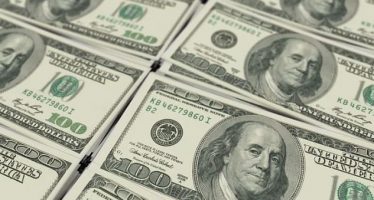The Great Lockdown and Echoes from the Past
 The brief and uneventful interlude that followed the Great Recession of 2007-13 has been supplanted by the Great Lockdown of 2020. The term was coined by Chief Economist Gita Gopinath of the International Monetary Fund (IMF) as she unveiled the global growth forecast for this year and the next. If there existed any doubt that the Great Lockdown was one for the history books, the numbers presented by Ms Gopinath ended that faint hope: in March, the global economy fell into a veritable black hole.
The brief and uneventful interlude that followed the Great Recession of 2007-13 has been supplanted by the Great Lockdown of 2020. The term was coined by Chief Economist Gita Gopinath of the International Monetary Fund (IMF) as she unveiled the global growth forecast for this year and the next. If there existed any doubt that the Great Lockdown was one for the history books, the numbers presented by Ms Gopinath ended that faint hope: in March, the global economy fell into a veritable black hole.
Even the darkest of doomsayers would not have dared predict such a sudden and near-total meltdown for fear of being branded a certified fool. Almost desperately looking for a silver lining, economists, analysts, businesspeople, and politicians have found none. The depth and girth of the Great Lockdown are such that visions of a Brave New World ready to emerge after the pandemic has abated almost instantly turn into expressions of delusion.
Though the Corona Crash is sudden, brutal, and unexpected, the period leading up to it has an ominous parallel in modern history, including an outcome that is rather unsettling. The order of events unfolding between 1918 and 1939 may have been different, but the ingredients were not: a pandemic, a market collapse, a shift in the global balance of power, and the rise of authoritarianism. With only a whiff of imagination, the Roaring Twenties of the last century may be reflected in the mindless celebration of hedonism that marked the years preceding the Great Lockdown.
In the latest edition of the IMF World Economic Outlook, global GDP is expected to shrink by 3.1 percent this year. In 2009, at the height of the financial crisis, the world’s economic output decreased by just 0.1 percent on average. In a blog post on the IMF website, Ms Gopinath notes that for the first time since the Great Depression both advanced and emerging economies are dipping into a recession simultaneously.
The IMF predicts per capita income levels to retreat in 170 countries. Advanced economies are hit hardest and can expect their GDP to lose an average of 6.1%. Emerging markets, excluding China, will shed 2.2 percent of their output. Amongst major economies, only China and India may be able to avoid shrinkage although any economic growth registered there in 2020 is expected to be anaemic.
The good news is that the crisis will be over by Christmas. According to the IMF forecast, next year should see the world economy bounce back vigorously. In 2021, global output may rise by as much as 5.8 percent, making up for most of the losses sustained during the pandemic. Growth in the advanced economies of Europe, North America, and the Far East will amount to 4.5 percent with Germany leading the pack (+5.2%). Emerging market economies can expect growth to average at 6.6 percent with China (+9.2%) in charge of the pulling. The rising tide will lift the rickety boats of low-income nations as well. The IMF forecasts 5.6 percent of economic growth in the least developed part of the world.
The picture painted in the IMF World Economic Outlook appears to offer plenty of reason for cautious optimism. The Great Lockdown seems to consist of a sharp and painful contraction followed by happy times. If the world manages to keep calm and carry on whilst the pandemic rages, a cornucopia of plenty will be its reward.
Hope – the last one to die as the Spanish saying goes – is the ultimate survival tool. Amidst all current uncertainty, there remains one unassailable fact: the Great Lockdown will not last forever. Just as day follows night, growth follows contraction. That knowledge is, however, of little use to people and businesses struggling to remain financially afloat whilst the recession does its worst.
In the US and the UK, commercial banks and government entities struggle to distribute the vast amounts of emergency cash earmarked for relief programmes. It is one thing for politicians to announce grand plans, but quite another for these to be implemented. Fully two weeks after Chancellor of the Exchequer Rishi Sunak threw the UK economy a £300+ billion lifeline, small- and medium-sized businesses have only been granted £1.1 billion in emergency loans. With few exceptions, commercial banks charged with getting the cash to where it is needed most have been dragging their feet, finding all sorts of reasons to reject applicants.
Though the UK government guarantees up to 80 percent of the loans, bankers are hesitant to take on their share of responsibility fearing that many of their business clients may not survive the pandemic in what then becomes a cruel self-fulfilling prophesy. In the US, the disbursement of emergency loans and grants has also hit numerous obstacles as evidenced by the seemingly unstoppable rise in the number of people who lost their job to the pandemic panic: 20 million and counting.
By removing any and all risk to banks, Germany has managed much better to shield its economy and preserve its businesses. Chancellor Angela Merkel and her economic team have displayed a remarkable agility in formulating and implementing a comprehensive and effective response to the crisis. Because of this, the country is well prepared to seize the moment once the virus has been contained. Germany and a few other Eurozone member states that balanced their fiscal accounts during the interlude between the Great Recession and the Great Lockdown are now able to limit the damage wrought by the pandemic and ensure a head start once economic activity starts to pick up.
As masters of their own currency, the UK and the US are able to do likewise and even better. The US in particular has already benefitted tremendously from its enviable position as keeper of the world’s reserve currency. In times of trouble, everyone buys into the US dollar, relegating upstarts such as the euro to, at most, a humble supporting role.
The US Federal Reserve was quick to establish 14 swap lines with overseas central banks to enable them to supply dollars to their strained domestic banking systems. The Fed also broke new ground by allowing countries to pledge Treasury bonds as collateral for dollar advances. This ensures that the global economy, and world trade, do not ground to a complete halt by a shortage of dollars. As such, the US Federal Reserve has been the unseen hero of the moment – and a reservoir of unequalled expertise in the management of the world’s financial affairs.
Critics of the pre-eminence of the US dollar, such as former Bank of England governor Mark Carney, argues that the rather unorganised state of fiscal affairs in the United States undermines the stability of the global financial system. Though Mr Carney’s arguments, and those of other critics, sounded pretty convincing at the time, they underestimated the curious fact that budget deficits and national debt are quite irrelevant when the culprit controls the only mint that matters.
Economic historian Adam Tooze of Columbia University agrees that the global financial system anchored on the US dollar is inherently unstable: “So is a bicycle, but if you’re a skilful rider, a bike is great. The Federal Reserve has demonstrated it’s a skilled rider of the dollar hegemony bike.”
Meanwhile, Europe’s attempt to undermine the dollar’s status as global reserve currency has been exposed for what it is: severely flawed and half-hearted. The Eurozone’s inability to agree on concerted action such as the pooling of debt and the mutualisation of risk, understandable though it is when watching events from a German or Dutch perch, keep the euro tied to its own continent. The euro’s moment has not arrived and is, perhaps, more distant than ever before. The common currency will undoubtedly survive the pandemic, albeit slightly tarnished and with less pretention.
Predicting the outcome of the Great Lockdown and the character of the post-corona world, remains fraught with danger. The IMF warns that the accuracy of its global outlook depends on the time it takes to contain the spread of the virus. Thus, any optimism must heed the lessons of history and pay attention to echoes from the past. ‘It will be over by Christmas’ is not a phrase that inspires confidence.
You may have an interest in also reading…
Double Dip Recession in the Making, UK Expected to Emerge First
The Deutsche Bundesbank expects a double dip recession. Analysing non-traditional indicators such as Google Map traffic data and air and
Global Markets Stall as Future Remains Uncertain
In this era of big and bigger numbers, the size of the US budget deficit – $864 billion in June
Saying No to China
What had originally been announced as a series of conferences followed by a high profile summit in Leipzig to seal
















































































